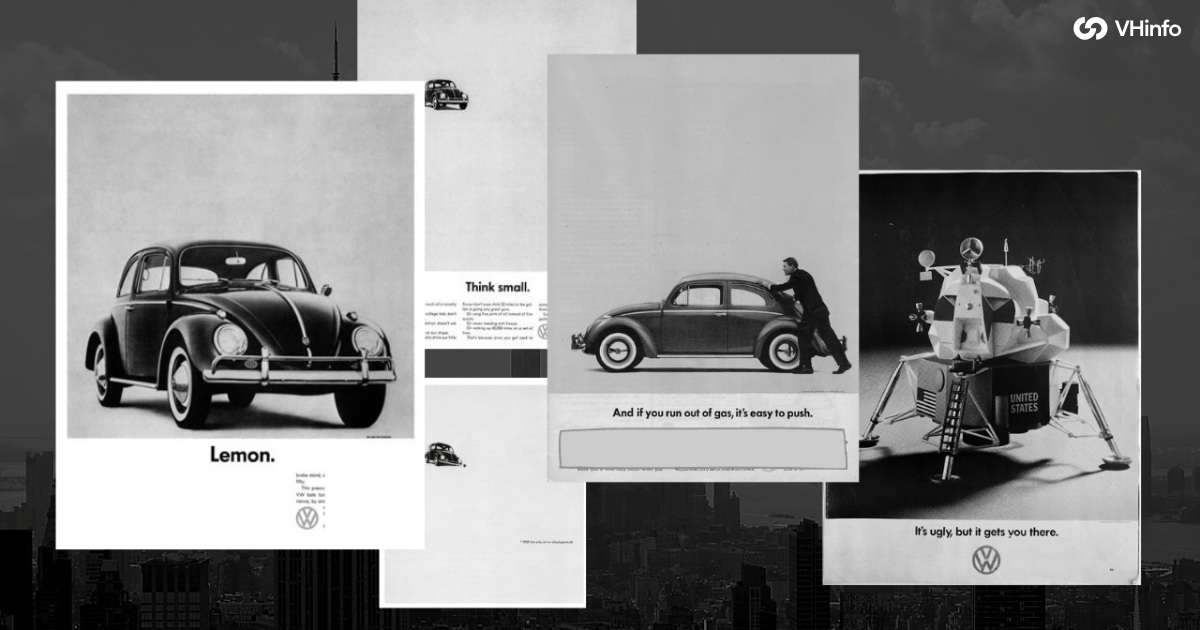In 1960, the Volkswagen Lemon ad flipped marketing on its head with one audacious word: “Lemon.”
Crafted by the visionary team at Doyle Dane Bernbach—Julian Koenig, Helmut Krone, and Bill Bernbach—this campaign broke every rule.
Instead of flashy claims, it used self-deprecating humor and radical honesty to highlight Volkswagen’s rigorous quality control. The ad transformed the Beetle’s small size and foreign roots into strengths, resonating with Americans tired of exaggerated ads.
Recognized by Ad Age as the 20th century’s greatest campaign, it sparked a creative revolution in advertising. For modern SaaS brands, the lesson is clear: authentic storytelling and transparent communication build trust better than hype.
At VH Info, we’ve seen how honest messaging in link building campaigns drives real connections, proving that vulnerability can be your greatest asset. Just as Volkswagen turned “lemons” into plums, today’s brands thrive by embracing their unique value with confidence.
What is the VW Lemon Ad?

The lemon ad showed a black-and-white photo of a Volkswagen Beetle. It was set against a plain white background. The ad had the word “Lemon” as its main headline. The body text started by saying, “This Volkswagen missed the boat.” It explained that the chrome strip on the glove box was damaged and needed fixing. Most people would not have seen it, but Inspector Kurt Kroner did.
The ad described how Volkswagen checks its cars closely for quality. It noted that 3,389 workers at their Wolfsburg plant checked Volkswagens at every stage of making them. The ad ended with the well-known line: “We pluck the lemons; you get the plums.”
This honest way of advertising changed how brands talk to customers, and it is still important today.
Who Created The VW Lemon Ad?
The VW Lemon ad came from three ad legends at Doyle Dane Bernbach. Julian Koenig wrote the famous headline.
He worked with art director Helmut Krone. They were guided by William Bernbach, their leader. Koenig had made great ads before, like Timex’s “Takes a licking and keeps on ticking.” He used his skill for simple yet strong messages in the Volkswagen campaign.
Krone designed the clean layout seen in many great Volkswagen ads. He avoided the busy and fancy ads of the 1950s. Instead, he chose clear and honest visuals to connect with people. Bernbach gave this team a smart plan to create an ad campaign that changed advertising forever.
The Historical Context of the VW Lemon Ad

The State of Advertising in the 1950s
The ads of the 1950s had big claims and fancy pictures. Bernbach said they were good at technique but lacked creativity. Traditional ad makers focused on product traits, famous people, and social standing. TV ads grew fast, from $41 million in 1951 to $336 million in 1953.
However, most campaigns used the same tired methods that cared more about selling than real talk. The ads of that time showed hope and wealth in America after the war. They pushed for bigger cars, fancier lives, and fitting in with society.
Advertisers aimed at younger people and families in suburbs. But their messages were not honest or simple like those of the creative change that came later. This old way opened doors for brands that wanted to connect honestly with people.
Volkswagen’s Challenges in Entering the U.S. Market
Volkswagen had big problems when it tried to enter the U.S. market in 1950.
The company sold only 330 cars through a New York agent that year. It had to compete with strong American car makers. The Volkswagen Beetle was made in Germany in the late 1930s. It had bad ties to Nazi Germany, which made it hard to sell in America.
Many Americans had just fought World War II. Car culture in the 1950s loved big size, power, and American-made products.
Driving U.S. cars was seen as a sign of patriotism and freedom. The small and weird-shaped Volkswagen Beetle seemed completely wrong for American buyers. Still, this challenge helped start one of the best rebranding campaigns in ad history.
The Creative Team Behind The Campaign
Bill Bernbach and DDB’s Role
William Bernbach helped start Doyle Dane Bernbach in 1949. He believed that ads should be honest and creative. They should also be based on real research instead of just selling.
Bernbach’s ideas went against the industry’s focus on technical skills over true creativity. He once said, “There are many great experts in advertising. Sadly, they often speak the best words. They know all the rules. They are the scientists of ads.” Bernbach’s work with Volkswagen showed the car’s truth and simplicity as strengths. He saw that buyers were tired of fake claims and tricks.
Under his guidance, DDB became known for ads that respected people’s smarts and feelings. This changed how the ad industry communicated with brands forever.
Helmut Krone’s Design Approach
Art director Helmut Krone changed how Volkswagen advertised cars. He went against the usual style of car ads.
Other brands used fancy pictures and many product shots. But Krone chose a very simple style. His ads showed one clear black-and-white photo of the Volkswagen Beetle. This photo was on a plain white background.
Krone wanted people to recognize his ads from far away, even at 20 yards. He did not use big logos or clear branding. He followed some ideas from David Ogilvy about layouts but made them very simple. This new style made Volkswagen ads different from others.
It also set rules for design that still inspire ads today.
Julian Koenig’s Copywriting Genius
Julian Koenig had a big role in the Think Small campaign. His work on the lemon ad was very important. He introduced what he called “simple ads that seemed meaningful.”
Koenig’s method flipped normal advertising upside down. Instead of hiding flaws, he showed them as proof of honesty and care. The smart part of Koenig’s work was changing negatives into strong positives with good storytelling. His words for the lemon ad did more than just say some Volkswagens had issues. They praised the brand for not selling bad cars.
This new way of writing changed how ads were made for many years and set fresh rules for honest brand communication.
Key Elements Of The VW Lemon Ad

Minimalist Design and Black-and-White Imagery
The visual execution of the volkswagen lemon ad represented a dramatic departure from the ornate, colorful advertisements dominating the automotive industry. Krone’s minimalist design featured a single black-and-white photograph of a volkswagen beetle positioned in the upper portion of the layout, with substantial white space surrounding the vehicle.
This stark simplicity immediately captured attention and conveyed the brand’s commitment to honest, unpretentious communication.
The choice to use unretouched photography rather than illustrated representations further emphasized authenticity.
While competitors relied on artistic interpretations that often exaggerated product features, volkswagen presented their vehicle exactly as it appeared in reality. This visual honesty reinforced the brand’s positioning as a company that valued transparency over artificial enhancement.
Self-Deprecating Humor in Advertising
The VW Lemon Ad pioneered the use of self-deprecating humor as a legitimate advertising strategy.
By calling their own product a “lemon“—a term that would later become synonymous with defective automobiles—volkswagen demonstrated unprecedented confidence in their quality control processes. This bold approach created cognitive dissonance that captured audience attention and encouraged deeper engagement with the brand message.
The self-deprecating approach served multiple strategic purposes beyond mere attention-grabbing. It positioned volkswagen as a brand secure enough to acknowledge imperfections, which paradoxically increased consumer confidence in the company’s overall reliability.
This psychological positioning helped differentiate volkswagen from competitors who made grandiose claims that consumers often viewed with skepticism.
The Use of “Lemon” to Highlight Quality Control
The central conceit of the advertisement—using “lemon” to describe a rejected vehicle—brilliantly reframed Volkswagen’s quality control as a competitive advantage.
The copy detailed how Inspector Kurt Kroner identified a blemished chrome strip that most consumers would never notice, demonstrating the company’s commitment to perfection at every level of production. This narrative transformed a potential negative (rejecting vehicles for minor flaws) into a powerful positive (uncompromising quality standards).
The ad’s explanation of volkswagen’s inspection process, including 3,389 quality control employees and 189 checkpoints per vehicle, provided concrete evidence supporting the brand’s quality claims.
This specific, factual approach contrasted sharply with the vague superlatives common in automotive advertising. The tagline “We pluck the lemons; you get the plums” succinctly captured this value proposition while maintaining the campaign’s distinctive tone.
Impact Of The VW Lemon Ad On Advertising

Changing Perceptions of Advertising Creativity
The success of the think small campaign and the lemon ad specifically sparked what became known as the “creative revolution” in advertising.
The campaign demonstrated that honest, intelligent communication could be more effective than traditional hard-sell approaches.
This realization fundamentally changed how the advertising industry approached creative development and client relationships.
David Ogilvy, despite his preference for multi-word headlines, acknowledged the campaign’s impact, stating: “The famous headline Lemon contributed a lot to the success of Volkswagen in America”.
The campaign’s success validated Bernbach’s philosophy that creativity and honesty could drive business results, inspiring a generation of advertising professionals to prioritize authentic communication over formulaic approaches.
Influence On Future Campaigns and Brands
The Volkswagen lemon ad established design and messaging principles that continue to influence advertising creative work today.
The campaign’s emphasis on simplicity, honesty, and strategic vulnerability became a template for brands seeking to build authentic connections with consumers. Modern companies across industries, including SaaS businesses, continue to reference the campaign’s approach to transparent communication.
The ad’s impact extended beyond advertising into broader cultural territory. The campaign helped establish “lemon” as common terminology for defective products, demonstrating advertising’s power to influence language and cultural understanding.
This linguistic legacy represents one of the most enduring impacts of any advertising campaign in history.
Lessons From The VW Lemon Ad

The Power of Honesty in Marketing
The Volkswagen Lemon Ad proved that radical honesty could be a powerful differentiator in crowded markets.
By acknowledging potential weaknesses upfront, Volkswagen built credibility that resonated with consumers tired of exaggerated marketing claims. This approach created a foundation of trust that supported long-term brand loyalty and market growth.
For modern SaaS companies, this lesson remains highly relevant. At VH Info, we’ve found that clients respond positively to transparent communication about link building challenges and realistic timelines.
Rather than making unrealistic promises, honest discussions about process and expectations often lead to stronger client relationships and better campaign outcomes.
Turning Weaknesses Into Strengths
Perhaps the most valuable lesson from the VW Lemon Ad lies in its demonstration of how perceived weaknesses can become competitive advantages through strategic positioning.
Volkswagen’s small size, unusual appearance, and foreign origins—all potential negatives in the American market—became selling points when framed properly through authentic storytelling.
This principle applies directly to modern marketing strategies across industries. SaaS companies often struggle with complex products or lengthy implementation processes, but these challenges can become strengths when positioned as thoroughness or attention to detail.
The key lies in honest communication that reframes limitations as evidence of quality or commitment to excellence.
FAQ’s:
What Does “Lemon” Mean in the Context of the Ad?
In the context of the Volkswagen lemon ad, “lemon” refers to a defective or substandard product that fails to meet quality standards.
The advertisement introduced this terminology to describe vehicles rejected during Volkswagen’s quality control process, specifically highlighting a Beetle with a blemished chrome strip that prevented it from reaching dealers.
The campaign cleverly appropriated this potentially negative term to demonstrate the company’s rigorous inspection standards.
Why is the VW Lemon Ad Considered Iconic?
The VW Lemon Ad achieved iconic status by revolutionizing advertising approaches through radical honesty and strategic vulnerability.
The campaign challenged industry conventions by using self-deprecating humor and acknowledging product limitations as evidence of quality control excellence.
Ad Age recognized the Think Small campaign, which included the lemon ad, as the greatest advertising campaign of the 20th century.
How Did the VW Lemon Ad Change Consumer Behavior?
The Volkswagen lemon ad helped shift consumer preferences toward smaller, more economical vehicles by reframing size and simplicity as advantages rather than limitations.
The campaign contributed to Volkswagen’s sales growth from 330 vehicles in 1950 to over 100,000 annually by 1958. More broadly, the campaign demonstrated that consumers responded positively to honest, intelligent advertising that respected their intelligence.
What Role Did the VW Lemon Ad Play in Volkswagen’s Branding Strategy?
The lemon ad served as a cornerstone of Volkswagen’s broader positioning strategy that emphasized honesty, reliability, and attention to detail. The campaign helped establish Volkswagen’s reputation for quality manufacturing and transparent communication, differentiating the brand from competitors who relied on traditional sales approaches.
This positioning supported long-term brand building and market expansion across North America.
Can the Success of the VW Lemon Ad Be Replicated Today?
While the specific context of the VW Lemon Ad cannot be replicated, its core principles—honesty, strategic vulnerability, and authentic communication—remain highly relevant for modern brands.
Contemporary companies can apply these lessons by acknowledging limitations honestly while demonstrating how those perceived weaknesses represent strengths or competitive advantages.
How is the VW Lemon Ad Remembered in Advertising History?
The Volkswagen lemon ad is remembered as a pivotal moment that launched the creative revolution in advertising. The campaign established new standards for creative excellence and demonstrated that intelligent, honest communication could drive significant business results.
Today, the ad serves as a benchmark for creative achievement and continues to influence advertising education and professional development programs worldwide.
Conclusion
The VW lemon ad represents far more than a successful advertising campaign—it stands as a testament to the power of authentic communication and strategic vulnerability in building brand trust.
The collaboration between Julian Koenig, Helmut Krone, and Bill Bernbach at Doyle Dane Bernbach created a campaign that not only transformed Volkswagen’s fortunes in America but also revolutionized the entire advertising industry.
The campaign’s emphasis on simplicity, honesty, and intelligent communication established principles that remain relevant for modern marketers across all industries. For SaaS companies working to build credibility in competitive markets, the lessons from this iconic Volkswagen ad provide a roadmap for authentic brand building through transparent communication.
At VH Info, we apply these time-tested principles to our link building strategies, helping SaaS brands build authority through honest, valuable content rather than manipulative tactics.
Just as the Think Small campaign proved that authentic communication could drive remarkable results, modern brands can achieve sustainable growth by prioritizing transparency and genuine value creation over short-term promotional tactics.


